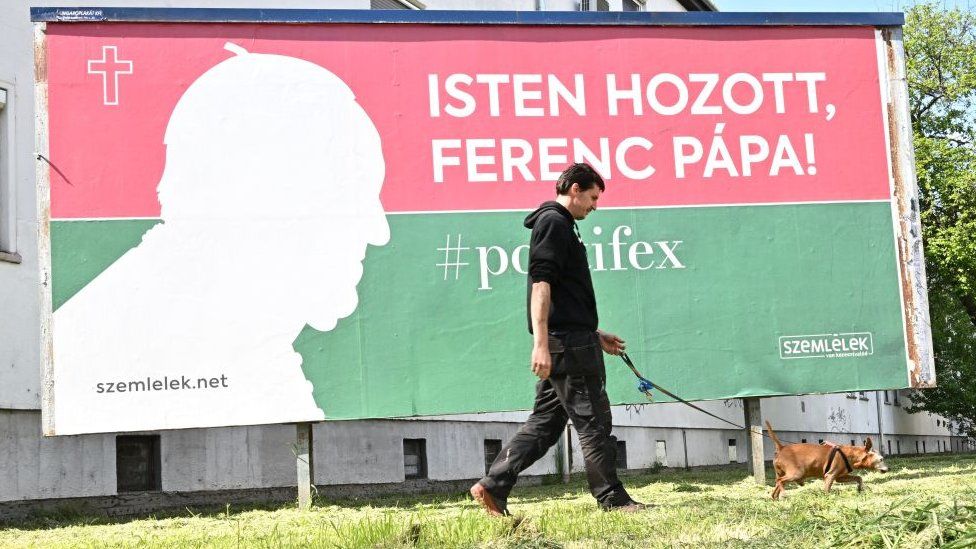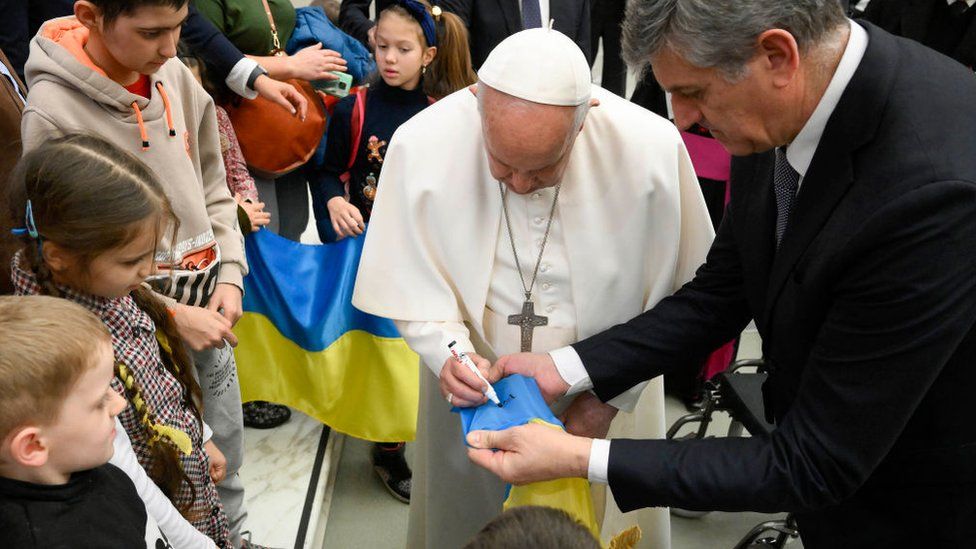Ukraine looms over Pope’s first trip to Hungary
Pope Francis arrives in Hungary on Friday for a three-day pastoral visit – his first full trip to the country since he became Pope 10 years ago.
What kept him away was the tough anti-migrant stance of Prime Minister Viktor Orban, in contrast to the 86-year-old pontiff’s compassion for all refugees.
What brings him here now, besides his support for Catholics, is the war in Ukraine.
Hungary and Ukraine share a 134km (85-mile) border.
But unlike other EU leaders, Mr Orban has refused to back military aid for Kyiv and maintained relations with Russia’s Vladimir Putin.
“It will also be a journey to the centre of Europe, over which the icy winds of war continue to blow,” the Pope said ahead of his visit.
The Argentine Pope has been to eastern Europe before – in 2019 to Romania and 2021 to Slovakia. On his way to Slovakia, he stopped for several hours to celebrate mass in Budapest, the closing event of the International Eucharistic Congress.
The pontiff promised to return, and careful Hungarian diplomacy in Rome led to this visit, which is being portrayed by pro-government media as a diplomatic triumph for the Orban government, even a chance to end its international isolation over the war in Ukraine.

“The Pope is with us,” declared the headline in Thursday’s Magyar Nemzet, the flagship daily of the governing Fidesz party. The Pope’s visit, the article suggested, was an endorsement of both the government’s so-called pro-peace policy in Ukraine, and its pro-family policies at home.
“From Rome, Pope Francis sees precisely this unfair struggle and senseless war hysteria,” the article went on. Hungary has refused to either supply arms to Ukraine, or to allow Nato allies to deliver them across Hungarian airspace.
On Thursday, however, the head of the Hungarian armed forces, Romulusz Ruszin-Szendi, was summarily sacked, with no reasons given. Media speculation centred on claims by an investigative new site, Atlatszo, that French military helicopters were delivered to Ukraine via an airbase in western Hungary.
A different view of the Pope’s visit comes from András Hodász, a former Roman Catholic priest who recently resigned from the priesthood because of differences of opinion with the church, and the pressure he came under to remain silent.
“The devil hides in the details,” Hodász told the BBC. “The Hungarian government is calling for peace at any cost. An immediate ceasefire which could confirm existing front lines. That contrasts with the words of the Holy Father, that Russia should pull back to the old borders. The Pope recognises Ukraine’s legitimate right to self-defence.”
The same public figures who condemned the Pope over migration in the past, he said, were now welcoming him with open arms. “Public opinion,” he remarked, “seems as fickle and manipulable as the wind”.
This is the Pope’s first foreign trip since he was treated in hospital for bronchitis at the end of March. Ahead of the visit, he met Ukrainian Prime Minister Denys Shmyhal, who invited him to visit Kyiv.

On Friday, Pope Francis will meet Mr Orban and Hungarian President Katalin Novak, the architect of the country’s attempts to encourage couples to have more children.
These include generous loans and payouts to married couples who promise to have children. The policies have had some success, but faltered during the pandemic.
On Saturday, the Pope will meet poor and homeless people, and refugees from Ukraine, Afghanistan, Sudan, Iran, Iraq and Pakistan. They include Abouzar Soltani, an Iranian convert to Christianity, who spent 18 months in detention in a Hungarian “transit zone”.
The Hungarian government has a special office to support persecuted Christians around the world.
The main conflict in the past between Pope Francis and the Hungarian government was the pontiff’s compassion for refugees and asylum seekers, contrasted with Hungarian government hostility.
While the Pope brought Syrian asylum seekers home with him from the Moria refugee camp in Lesbos, Mr Orban built a razorwire fence along a 175km (108-mile) border with Serbia, and suggested that all migrants are potential terrorists.
To enter Hungary overland, would-be asylum seekers need to request permission to apply in the Hungarian embassy in Belgrade. In 2022, 16 applications were made, and of these, only four people were allowed into the country, according to figures from the Hungarian Helsinki Committee, a human rights group.
By contrast, Hungary has been generous to Ukrainian refugees, helping 2.5 million cross the country in the past year, and supporting around 35,000 who decided to stay.
The Pope’s visit ends on Sunday, with the celebration of mass in Kossuth square, in front of the Hungarian parliament. Hundreds of thousands are expected to attend, including Hungarians from neighbouring countries.



